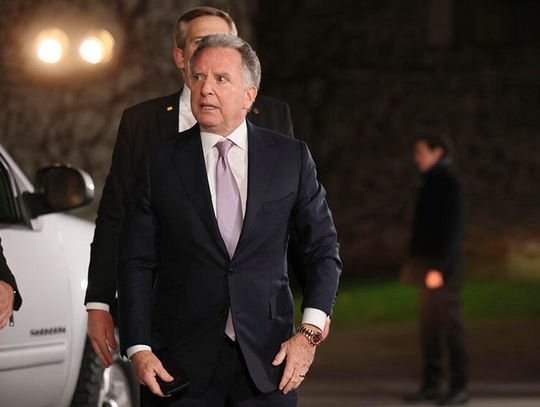Skomplikowane i wciąż zmieniające się sieci układów, sojuszy oraz konfliktów, w których znaczącymi stronami są również często aktorzy niepaństwowi, są charakterystyczną cechą sceny geopolitycznej Bliskiego Wschodu. Powiązania pomiędzy poszczególnymi krajami, organizacjami religijnymi, paramilitarnymi i terrorystycznymi oraz zamorskimi mocarstwami potrafią zdezorientować nawet wprawnych obserwatorów, a tym bardziej osoby niezwiązane z tematem. Niemniej, warto zaznaczyć sobie kilka podstawowych cech kształtujących dzisiejszą rzeczywistość Bliskiego Wschodu.
Mówiąc (bądź pisząc) o tym regionie nie można zapominać o tym, dlaczego jest on tak istotny. Chodzi rzecz jasna o zasoby energetyczne, przede wszystkim ropę, która najbardziej w powszechnej świadomości kojarzy się z tym regionem. Jest to kwestia dość oczywista, jednak warta wspomnienia. To ropa, wraz ze strategicznym położeniem na styku trzech kontynentów i przechodzących przez nie szlaków handlowych, jest głównym powodem, dla którego światowe mocarstwa interesują się Bliskim Wschodem, rywalizując między sobą i starając się zwiększać swoje lokalne wpływy.
Natomiast jeśli chodzi o wydarzenia, które w głównej mierze ukształtowały Bliski Wschód, to XX wieczna historia regionu została zdefiniowana przede wszystkim przez wydarzenia takie jak rozpad Imperium Osmańskiego, interwencje kolonialnych potęg, powstanie państwa Izrael oraz Rewolucja Irańska z roku 1979. Oczywiście w drugiej połowie zeszłego stulecia istotna dla bliskowschodniego układu sił była również tocząca się w tle Zimna Wojna. W tym miejscu warto wspomnieć o peryferiach regionu, Afganistanie, gdzie wojna domowa, radziecka interwencja w latach 1979-1989 i wsparcie USA dla antykomunistycznych bojowników doprowadziły w efekcie do powstania Al-Kaidy, do niedawna najsłynniejszej fundamentalistycznej organizacji terrorystycznej, oraz tzw. internacjonalizacji dżihadu, co z kolei zapoczątkowało „wojnę z terroryzmem”.
XX wiek obfitował więc w masę punktów zwrotnych, które do dzisiaj w mniejszym lub większym stopniu są istotne i nie da się od nich uciec podczas prób analizy współczesnych problemów Bliskiego Wschodu i toczących się wydarzeń. Z przytoczonych tutaj wątków, stanowiących swego rodzaju cezury, następnie wynikały kolejne, z czasem wzajemnie się nawarstwiające i przenikające między sobą, podobnie jak aktorzy biorący w nich udział. XXI wiek przyniósł nam kolejne momenty przełomowe, z czego pierwszym była II Wojna w Zatoce Perskiej, lepiej znana jako Wojna w Iraku, która w dużej mierze zdestabilizowała region, tworząc podatny grunt pod powstanie później tzw. Państwa Islamskiego. Kolejny moment to seria protestów i rewolucji z roku 2011, nazywanych przez jednych „Arabską Wiosną”, a przez innych „Arabską Zimą”.
Tyle jeśli chodzi o historię, w bardzo ogólnej formie. Istotnych wątków można przytoczyć jeszcze więcej i o każdym z nich rozpisywać się godzinami, wszystkie na swój sposób nazywając istotnymi przy próbie wytłumaczenia dzisiejszej dynamiki wpływającej na obraz Bliskiego Wschodu. A prezentuje się ona następująco: we wrześniu dwa kolejne państwa, Zjednoczone Emiraty Arabskie oraz Bahrajn, nawiązały oficjalne stosunki dyplomatyczne z Izraelem. Wydarzenie to jest punktem przełomowym szerszego procesu, jakim jest rosnąca akceptacja państw arabskich dla Izraela, kosztem (nieoficjalnie) sprawy palestyńskiej, w celu utworzenia zjednoczonego frontu wobec innych regionalnych rywali – Turcji oraz Iranu. W proces ten wpisują się również inne, pozornie nieistotne wydarzenia, jak chociażby fakt, że największa anglojęzyczna gazeta w Arabii Saudyjskiej „Arab News” 18. września br. złożyła życzenia z okazji judaistycznego święta Rosz ha-Szana (Nowego Roku), zmieniając swoje zdjęcia profilowe w mediach społecznościowych na życzenia zapisane pismem hebrajskim, wzbudzając przy tym wiele kontrowersji. Potwierdziło to jednak przekonanie, że chociaż sama Arabia Saudyjska nie może sobie pozwolić na nawiązanie oficjalnych stosunków dyplomatycznych z Izraelem, to przychylnie będzie patrzeć na tego typu działania w przypadku innych państw arabskich i je cicho wspierać, samemu ograniczając się do tego typu gestów.
Za przykład „normalizacji” kontaktów, czy bardziej zapowiedź takowej w przyszłości, niektórzy wskazywali negocjacje izraelsko-libańskie dotyczące granicy morskiej, które rozpoczęły się 12. października. Sekretarz Stanu USA Mike Pompeo nazwał je „historycznymi” (Izrael oraz Liban oficjalnie są w stanie wojny), jednakże prezydent Libanu Michel Aoun ostudził nieco ten zapał oświadczając, że niebezpośrednie rozmowy ograniczone będą do kwestii technicznych, a żadna poważniejsza normalizacja nie będzie miała miejsca w najbliższej przyszłości. Pytanie jednak, czy takowej nie wymusi pogarszająca się sytuacja ekonomiczna Libanu i potrzeba znalezienia nowych partnerów gospodarczych. Kraj, niegdyś nazywany „Szwajcarią Bliskiego Wschodu”, od lat zmaga się z kryzysem gospodarczym i finansowym, ale również społecznym i politycznym, spotęgowanymi wybuchem w bejruckim porcie 4. sierpnia br. Pytanie więc, czy jeżeli szansą na poprawę sytuacji byłoby nawiązanie stosunków dyplomatycznych z Izraelem, to czy Liban by z niej skorzystał?
Proces redefiniowania się relacji izraelsko-arabskich to jedna z głównych kwestii cechujących współczesną dynamikę układów na Bliskim Wschodzie, będący jednak nie przyczyną, a konsekwencją innych procesów. Dla głównych przedstawicieli obozu „arabskich sprzymierzeńców Stanów Zjednoczonych”, czyli Egiptu, Arabii Saudyjskiej i Zjednoczonych Emiratów Arabskich, rywalami są przede wszystkim Turcja oraz Iran. O ile w przypadku Iranu mamy do czynienia z wieloletnią już wrogością, do tego motywowaną niekiedy religijnie (szyicki Iran przeciwstawiony państwom sunnickim), to tworzenie otwarcie antytureckiego obozu jest swego rodzaju nowością. W tej retoryce przoduje Egipt, gdzie chociażby 9. września br. szef egipskiej dyplomacji Sameh Szukri wezwał kraje arabskie do przyjęcia „zdecydowanej i jednomyślnej” polityki skierowanej przeciwko Turcji. Miało to miejsce dzień przed specjalnym posiedzeniem ministrów spraw zagranicznych członków Ligi Państw Arabskich, w trakcie którego potępione zostały tureckie interwencje w Syrii, Libii oraz Iraku.
Egipt nie jest jedynym krajem arabskim starającym się zwalczać tureckie wpływy w regionie, jednak niewątpliwie robi to najbardziej zaciekle, będąc niemal w stanie otwartej wojny z Ankarą. Główna kością niezgody jest tutaj w ostatnim czasie Libia, gdzie Kair w wojnie domowej wspiera siły generała Chalify Haftara i tzw. Libijskiej Armii Narodowej, reprezentujących rząd w Tobruku. Turcja natomiast udziela pomocy rządowi w Trypolisie (Rząd Porozumienia Narodowego), będącemu również oficjalnie uznawanym na arenie międzynarodowej, także przez Ligę Państwa Arabskich. Kair obawia się jednak, że zwycięstwo drugiej strony uczyniłoby z Libii przystań dla różnego rodzaju ekstremistów. A że kraj ten sąsiaduje z Egiptem, to taka sytuacja stanowiłaby zdaniem egipskich decydentów bezpośrednie zagrożenie dla bezpieczeństwa wewnętrznego kraju nad Nilem. Korzenie napięć na linii Kair-Ankara, w tym również w kontekście Libii, sięgają jednak roku 2013 i wojskowego przewrotu w Egipcie. W jego wyniku obalono prezydenta Muhammada Mursiego, powiązanego z organizacją Braci Muzułmanów, powołanego na urząd po wyborach będących następstwem wydarzeń Arabskiej Wiosny z 2011 roku i utracenia władzy przez Hosniego Mubaraka. Prezydentem został następnie Abd al-Fattah as-Sisi, wcześniej generał stojący na czele przewrotu, który rozpoczął ogólnokrajowa kampanię przeciwko Braciom, uznając ich za organizację ekstremistyczną. Zamach stanu został potępiony przez Turcję z Recepem Tayyipem Erdoğanem na czele, który oprócz osobistej niechęci do przewrotów wojskowych obalających zbyt „islamistyczne” rządy, postrzegał Mursiego jako sojusznika. Od tamtego czasu nazywa Sisiego dyktatorem i tyranem, ten natomiast nie pozostaje mu dłużny i oprócz rzucania w kierunku tureckiego prezydenta podobnych określeń, oskarża go również o wspieranie ekstremistów spod znaku Braci Muzułmanów i próby destabilizowania sytuacji w regionie, między innymi w Libii. W antytureckim tonie ostatnio coraz częściej wypowiadają się również Arabia Saudyjska i Emiraty. Chociażby 3. października przewodniczący saudyjskiej Izby Handlowej Adżlan al-Adżlan wezwał obywateli królestwa za pośrednictwem Twittera do „bojkotowania wszystkiego, co tureckie”. Natomiast minister stanu ds. zagranicznych Emiratów, Anwar Gargasz, 10. października br. stwierdził, że turecka obecność wojskowa w Katarze „wzmacnia polaryzację i nie uwzględnia suwerenności państw oraz interesów krajów Zatoki Perskiej i jej mieszkańców”. To tylko najnowsze wypowiedzi saudyjskich i emirackich oficjeli skierowane przeciwko Turcji.
Dzisiejszy Bliski Wschód można więc uprościć następująco: z jednej strony mamy Izrael plus arabskie państwa sunnickie będące w dobrych stosunkach ze Stanami Zjednoczonymi; z drugiej Turcja, Katar oraz Bracia Muzułmanie; z trzeciej nieomówiony tu szerzej Iran i jego sprzymierzeńcy (Hezbollah, szyickie milicje w Iraku, rząd syryjski). Rywalizacja między nimi toczy się na polu Libii, Syrii, Iraku oraz Jemenu, a do już i tak zagmatwanych sieci układów i interesów należałoby dodać jeszcze aktorów poza regionalnych (USA, Rosja, Chiny, również Francja). Niemniej, można się spodziewać, że przynajmniej przez kilka najbliższych lat dynamika stosunków międzynarodowych na Bliskim Wschodzie będzie przebiegała według tego trójosiowego schematu. Stanowi to z pewnością zagrożenie dla integralności NATO, w którym Turcja stanowi ważną siłę, a jej ambicje nierzadko są sprzeczne z interesami pozostałych członków. Pytanie też, jak w owym układzie odnajdą się pozostałe państwa regionu – pierwszy obóz chciałby zjednoczonego arabskiego frontu i nierzadko powołuje się na „arabskość” przeciwstawioną „tureckości” oraz „perskości”. W tym miejscu przede wszystkim przyszła rola Omanu i Kuwejtu są bardzo interesujące. W przeszłości państwa te wielokrotnie przyjmowały bowiem pozycję mediatorów, teraz jednak po zmianie władzy w obu krajach (najpierw śmierć sułtana Qaboosa w styczniu br., a pod koniec września emira Sabaha) nowi przywódcy mogą nie mieć aż tak silnej pozycji, jaką mieli ich poprzednicy. Najważniejsze jednak dla bliskowschodniego układu sił będą wyniki amerykańskich wyborów prezydenckich i kształt polityki przyszłej administracji amerykańskiej.
Maciej Śmigiel
Absolwent arabistyki i islamistyki na Uniwersytecie Warszawskim, w trakcie studiów odbywał stypendia naukowe w Egipcie oraz Maroko. Obecnie doktorant w Szkole Doktorskiej Nauk Humanistycznych UW (nauki o kulturze i religii). Doświadczenie zawodowe zdobywał m.in. na praktykach w Centrum Antyterrorystycznym ABW, Ambasadzie RP w Kairze oraz Biurze Bezpieczeństwa Narodowego. Koordynator projektów w polskim think-tanku Warsaw Institute.
__________________________________________________________________________
The Warsaw Institute Foundation to pierwszy polski geopolityczny think tank w Stanach Zjednoczonych. Strategicznym celem tej organizacji jest wzmocnienie polskich interesów w USA przy jednoczesnym wspieraniu unikalnego sojuszu między dwoma narodami. Jej działalność koncentruje się na takich zagadnieniach jak geopolityka, porządek międzynarodowy, polityka historyczna, energetyka i bezpieczeństwo militarne. The Warsaw Institute Foundation została założona w 2018 roku i jest niezależną organizacją non-profit, inspirowaną bliźniaczą organizacją działającą w Polsce – Warsaw Institute.
The Warsaw Institute Foundation is Poland’s first geopolitical think tank in the United States. The strategic goal of this organisation is to bolster Polish interests in the U.S. while supporting the unique alliance between the two nations. Its activity focuses on such issues as geopolitics, international order, historical policy, energy, and military security. Established in 2018, The Warsaw Institute Foundation is an independent, non-profit organization inspired the twin Poland-based Warsaw Institute.
Więcej o autorze / autorach:
Reklama











